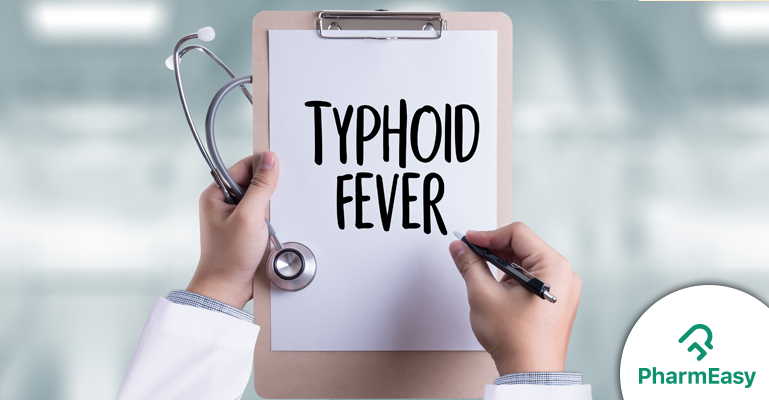All You Need To Know About Typhoid!
By Dr. Vishesh Bharucha +2 more

Get,

to manage your symptom
Get your,


4 Cr+ families
benefitted

OTP sent to 9988776655



You’ve successfully subscribed to receive
doctor-approved tips on
Whatsapp

Get ready to feel your best.

Hi There,
Download the PharmEasy App now!!


Register to Avail the Offer
Send OTPBy continuing, you agree with our Privacy Policy and Terms and Conditions

Hi There,
Sign up on PharmEasy now!!
Trusted by 4 crore+ families

OTP sent to 9988776655



You have unlocked 25% off on medicines




Code: NU25

Comments


Leave your comment here
By Dr. Vishesh Bharucha +2 more
Table of Contents
Typhoid is a bacterial infection caused by Salmonella typhi, a bacterium. It is typically characterised by high fever, nausea, vomiting, and, in some cases, diarrhoea. The disease is primarily transmitted through the consumption of food or water contaminated with faecal matter, making it more common in areas with inadequate sanitation and limited access to clean drinking water. If left untreated, typhoid can be fatal. However, with timely diagnosis and appropriate antibiotic treatment, most individuals make a full recovery. Improving hygiene and sanitation practices is key to preventing the spread of this potentially life-threatening illness..

Other serious complications include1:
Common and more specific complications of typhoid include1:
In many cases, individuals may carry Salmonella typhi without showing any noticeable symptoms, a condition known as being an asymptomatic carrier. These carriers can unknowingly contribute to the spread of the infection. Once symptoms become evident, such as persistent fever and gastrointestinal discomfort, a course of antibiotics is typically prescribed to manage the infection and help recovery2.
In addition to antibiotic treatment, individuals diagnosed with typhoid are often advised to stay well-hydrated by consuming clean, preferably boiled water, and to practise strict food hygiene, such as thoroughly washing fruits and vegetables before consumption2.
During pregnancy, typhoid can lead to serious complications, including miscarriage, premature labour, intrauterine growth restriction (IUGR), and even faetal loss, largely due to systemic infection and high maternal fever3. Vaccination offers a significant degree of protection and is especially recommended for those living in or travelling to areas where typhoid is endemic. However, as no vaccine provides complete immunity, it must be complemented by good sanitation and hygiene practices to effectively prevent infection and limit its spread4.
If an individual has not been exposed to the Salmonella typhi bacterium, typhoid vaccination is often recommended as a preventive measure. Doctors may prescribe the vaccine to those who are carriers of the disease, individuals in close contact with typhoid patients, or persons planning to travel to regions where typhoid fever is prevalent. The vaccine is available in two forms: an oral capsule (Ty21a) or a single-dose injection (Vi polysaccharide). However, the vaccine is preventive rather than therapeutic, meaning it does not treat active infections and is ineffective once illness has begun. It is also not suitable for very young children. The polysaccharide vaccine is approved for children aged two years and above, while the oral Ty21a vaccine is approved for those aged six years and older. In rare cases, the vaccine may cause mild side effects, including gastrointestinal discomfort, headache, or nausea, and should therefore be administered under medical supervision2.
Typhoid fever is an illness you get from S. Typhi bacterium. It causes a high fever, flu-like symptoms, and diarrhoea. You can be contagious with typhoid even if you don’t feel sick. Typhoid can be life-threatening and is usually treated promptly with antibiotics.
Dr. M.G. Kartheeka, MBBS, MD(Pediatrics)
To reduce the risk of contracting Salmonella typhi, it is advisable to follow these preventive practices, especially when travelling to or living in areas where typhoid is common5:
To minimise the risk of contracting or spreading typhoid, it is important to follow these essential personal hygiene practices6:
Typhoid is a serious but preventable bacterial infection that spreads through contaminated food and water. Maintaining good hygiene, following safe food and water practices, and considering vaccination where appropriate are key to prevention. With prompt medical attention and responsible habits, the risks associated with typhoid can be significantly reduced.
Also Read: Typhoid Vaccine: What is It, Types, When to Be Taken & Side Effects
Disclaimer: The information provided here is for educational/awareness purposes only and is not intended to be a substitute for medical treatment by a healthcare professional and should not be relied upon to diagnose or treat any medical condition. The reader should consult a registered medical practitioner to determine the appropriateness of the information and before consuming any medication. PharmEasy does not provide any guarantee or warranty (express or implied) regarding the accuracy, adequacy, completeness, legality, reliability or usefulness of the information; and disclaims any liability arising thereof.
Comments

Leave your comment...

View all comments(1)
You may also like
Very Best Suggestion for health